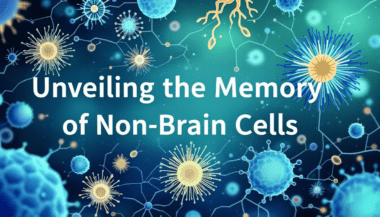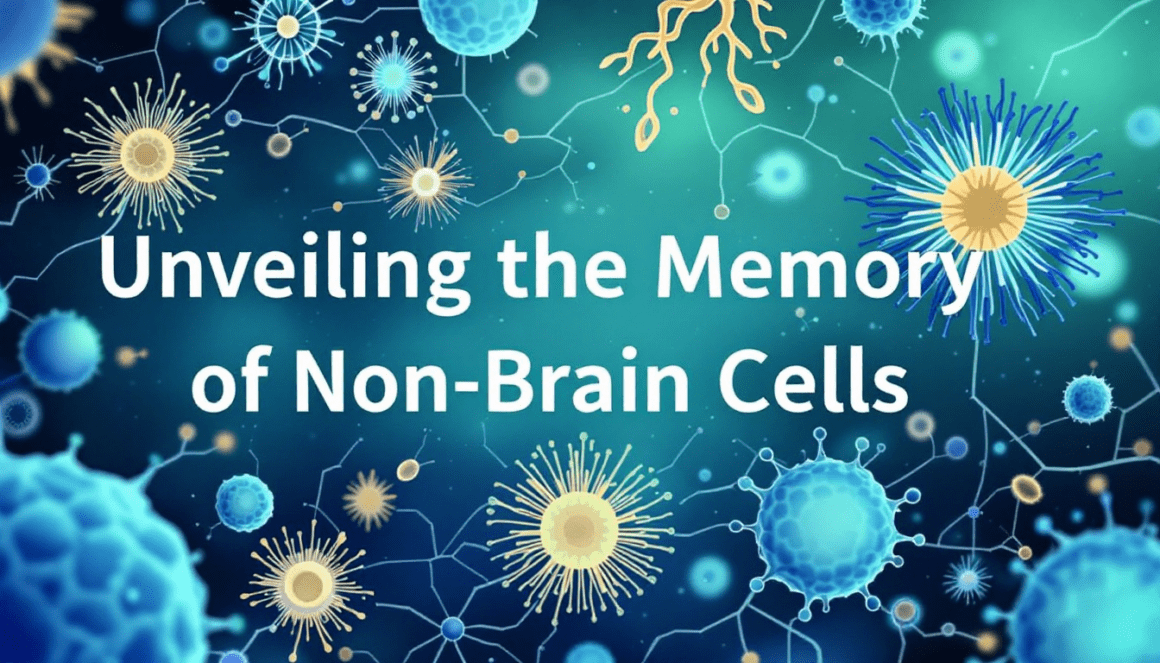Imagine a world where memories reside not only in our brains but in the very cells that make up our body. Recent studies indicate that certain cells, such as those in the kidneys and nerves, possess memory-like capabilities similar to neurons. Such revelations could fundamentally change our understanding of health, disease management, and the mechanisms controlling our bodies. According to the World Health Organization, over 1.9 billion adults worldwide are overweight, while the CDC reports that nearly 40% of adults in the U.S. are classified as obese. Traditional views surrounding memory have predominantly focused on the brain, but these emerging insights suggest that our cellular architecture plays a significant role in health outcomes.
The Dawn of a New Understanding
Recent findings from New York University are paving the way for a revolutionary understanding of cellular memory. Lead author Nikolay Kukushkin and his team uncovered that kidney and nerve cells exhibit memory functions akin to those of brain cells. This breakthrough shifts the paradigm of how we perceive memory—no longer confined solely to the cerebral domain but rather a multifaceted phenomenon spread throughout the body’s cellular framework.
Employing methodologies akin to those used in studying brain cells, the researchers exposed these non-neuronal cells to chemical signals in a spaced-out manner. This approach mirrors the way traditional memories are formed, indicating that cells beyond the brain can accumulate information and respond to stimuli over time. The activation of a memory storage gene in these non-brain cells supports their capacity to retain unique types of memories relevant to their specific functions. As a result, this understanding of memory expands beyond cognition, suggesting that every cell type retains information pertinent to its role in the body, thus influencing overall health.
Memory in Action: The Functionality of Non-Brain Cells
One striking example of cellular memory is observed in kidney cells. These cells may remember patterns of salts and fluids, which is vital for maintaining homeostasis and regulating blood pressure. When exposed to varying concentrations of these substances over time, kidney cells demonstrate an ability to adapt their physiological responses, reminiscent of how humans adjust behaviors based on past experiences. This phenomenon underscores a remarkable adaptation strategy, suggesting that our organs act as smart regulators, recalibrating their functions based on prior stimuli.
Furthermore, pancreatic cells show similar behavioral dynamics. They adjust their insulin responses according to historical sugar intake patterns. This adaptive capability hints at a broader mechanism wherein cells ‘learn’ from ongoing interactions with their environment, thus playing a pivotal role in metabolic health. Such cellular memories can have profound implications for conditions like diabetes, where understanding these mechanisms might lead to more effective treatments.
Metabolic Memory: The Weight of Past Experiences
Another compelling study from ETH Zurich has brought to light the concept of metabolic memory, particularly within adipocytes or fat cells. This research illustrates how fat cells possess an enduring memory of obesity, which can complicate weight loss efforts. This phenomenon explains why maintaining weight loss can be an uphill battle, as adipocytes ‘remember’ their previous state and actively resist permanent changes despite efforts to shed excess weight.
Ferdinand von Meyenn, a key researcher in this study, highlights that this epigenetic memory encoded in fat cells enables them to swiftly respond to environments conducive to weight gain. Thus, those with a history of obesity may find themselves at a greater risk of regaining weight, not merely due to lifestyle choices but due to intrinsic biological programming. This revelation suggests that weight management extends beyond willpower and diet; it is intricately woven into our cellular makeup.
The implications of metabolic memory are significant, especially as obesity rates continue to rise globally. Understanding how these cells retain information could guide new therapeutic strategies aimed at tackling obesity and metabolic disorders. While current interventions to erase such memories are still in the realm of future research, maintaining a healthy weight and exploring nutritional supplements might offer some respite from these ingrained cellular responses.
Implications for Health: From Diabetes to Obesity
The burgeoning field of non-brain cell memory is poised to open new avenues in medical research, particularly concerning metabolic disorders and chronic diseases. For instance, in diabetes management, recognizing how pancreatic cells remember their insulin responses could lead to more personalized treatment plans that address both current needs and historical patterns of sugar intake.
Moreover, this understanding could influence how we approach weight loss interventions. Traditional methods often emphasize calorie restriction and exercise, overlooking the biological factors that can impede long-term success. By acknowledging the resistance posed by adipocyte memory, healthcare professionals might design more effective programs that combine behavioral strategies with biological insights. This dual approach could prove valuable in combating obesity and related illnesses, offering hope to those who have struggled with weight management.
Additionally, the implications extend beyond metabolic health. The role of memory in immune cells, for example, might reveal insights into vaccine efficacy and how our bodies respond to pathogens over time. Such explorations can further expand our comprehension of memory’s role in various health conditions, thereby guiding future research and therapeutic innovations.
Future Research: Unraveling the Complexities of Cellular Memory
The exploration of non-brain cell memory is still in its infancy, yet the potential for groundbreaking discoveries is immense. As researchers delve deeper into this field, they will likely uncover additional layers of complexity regarding how various cell types store and utilize memories. Future studies are anticipated to focus on uncovering the mechanisms responsible for these cellular memories, including the genetic and epigenetic factors at play.
Moreover, further research will be essential to explore potential interventions aimed at mitigating the effects of cellular memory, particularly in the context of obesity and metabolic disorders. Investigating nutritional supplements or lifestyle modifications that may help cellular adaptation could lead to innovative approaches in healthcare.
In parallel, a focus on understanding how the memory capabilities of different cell types interact will be vital. As we strive to unravel the intricate web of cellular memory, we stand on the brink of a new era in health management—one where individualized treatment plans could be informed by the unique memories embedded within our cells. Such insights would not only advance the medical field but also empower individuals to take charge of their health journeys.
Conclusion: A Future Worth Exploring
The exploration of non-brain cell memory opens a window into a future where our understanding of health, memory, and disease is profoundly transformed. As this area of research evolves, we will likely uncover more about the intricate ways our bodies retain and process information, potentially reshaping treatment strategies for various health conditions.
If you are intrigued by these findings and their implications for health, we invite you to follow our journey into exploring the “Memory” of Non-Brain Cells and Its Health Implications. Together, we can delve deeper into how our cellular makeup influences our health, paving the way for novel approaches to managing chronic conditions.












